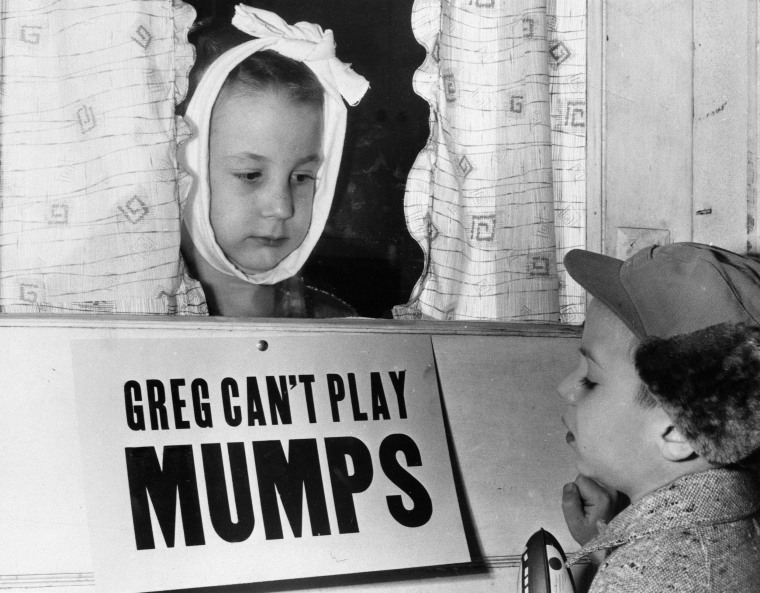A mumps outbreak at Harvard University that began in early March has climbed to 41 cases as of Thursday, and could impact the school’s May 26th graduation ceremony and other campus events.
Harvard University’s Health Services has been working closely with local and state health departments to track the spread of the infection and keep the Cambridge, Massachusetts community informed about the best way to stop the spread of the contagious disease.
Paul J. Barreira, director of Health Services, told the student newspaper, the Harvard Crimson, that he’s alarmed by the high number of confirmed cases.
“I’m actually more concerned now than I was during any time of the outbreak, I have to say. I’m desperate to get students to take it seriously that they shouldn’t be infecting one another.”
Harvard isn't the only college in the Boston area hit by mumps this spring — Boston University, the University of Massachusetts and Tufts University have also reported cases among their students.
The largest mumps outbreak in 20 years occurred in 2006, with at least 6,500 cases in 11 states, many of them at midwestern colleges. That outbreak prompted concerns about the waning effectiveness of the MMR vaccine given during infancy.
Mumps outbreaks tend to happen in winter and spring, in crowded environments (like college dorms). The challenge for Harvard officials is to stop the spread — the virus is contagious even before symptoms appear —before the commencement, which will feature director Steven Spielberg as speaker.
If you're the parent of a college student, or a college student, here's what you need to know about mumps:
First off, why is the viral illness called mumps?
It dates back centuries and comes from terms meaning either to grimace or mumble while eating. That's not a surprise, since the disease causes the salivary glands in the face to swell and painful swallowing.
So what is mumps and how do I know I have it?
Mumps is a disease caused by a contagious virus. The tell-tale sign that someone has mumps is puffy cheeks, although not everyone with mumps has puffy cheeks. Some people just have very mild flu-like symptoms, and often don’t even know they have been infected. Although we think of mumps as a childhood disease, anyone who hasn’t been vaccinated is vulnerable, as we see in recent outbreaks.
Fortunately, most people recover completely in a few weeks and only in some cases develop complications. One of the more serious but rare complications may be “orchitis”, a pain or swelling in the testicles which can sometimes lead to sterility — the inability to father a child.
There’s no treatment for mumps but you can ease the pain of the swollen salivary glands with warm and cold packs and over-the-counter pain relievers like acetaminophen.
How are mumps spread?
Mumps is not as contagious as measles, but still infects more than half of unvaccinated people who come into contact with the virus. The virus is in saliva so an infected person can spread it by kissing, coughing, sneezing or even talking. Mumps can be contagious before someone has puffy cheeks and up to five days after the swelling begins.
The best way to protect against mumps is the MMR vaccine.

Why do vaccinated college students still get the mumps?
Two doses of the MMR (mumps-measles-rubella) vaccine does a pretty good job to prevent most cases. However, we now know the vaccine wanes and after about 10 years it’s only 80-85 percent protective. If a vaccinated person does get infected though, they usually have a milder form of mumps than someone who’s unvaccinated.
Related: Mumps vaccine can lose its punch by college years
Is there a “booster” mumps vaccine for college students?
Not in the way most people think of as a booster shot. Children usually receive two doses of the vaccine: the first when they’re 12 months old and the second when they start school. The second dose is not a booster; it’s intended to produce immunity in the small number of people who might fail to respond to the first dose.
But there are times outside of young childhood when we might administer a dose. Most colleges want proof of vaccination when a young person enters in the first year, and if there was no second dose, or no proof of a second dose, we often give it then.
Related: 7 vaccine myths debunked by doctors
Sometimes, during an outbreak, doctors will even administer a third dose. There’s still a bit of debate around whether this really helps, but there’s no harm in giving the vaccine to someone who is already immune.


